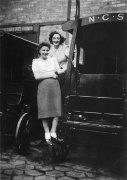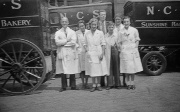 |
| Me and Gladys on a horse drawn van on the NCS Bakery forecourt. 1941. |
The manager of the bakery was Mr Meldrum and his deputy was Mr James. The chief clerk was Tom Murdock and the other clerks were Dave, Lil and Margaret. Ron was another junior clerk on the staff while he waited for his call-up into the RAF. One of my duties was answering the telephone and operating the switchboard. I had never used the telephone before but I learned quickly once I was given some friendly instruction. This was an example of how everyone worked together in the whole bakery.
A year later the office staff would be joined by Gladys who was a shorthand typist employed to assist Mr Meldrum because he now had additional work, having been made Nottingham and District Area Manager for the Ministry of Food.
The bakery was in Meadow Lane, Nottingham, and the office was on the first floor above the loading bay where the delivery carts were lined up. The horses were kept in the stables further up Meadow Lane. The machines for making the bread, the confectionery department, and the canteen were on the ground floor. The canteen was very good and provided hot or cold meals throughout the day and night. The canteen was a very large room with a balcony and a huge bay window overlooking the River Trent.
I was happy working there and time sped by. So far the war had very little impact on my life except that many of the young men were being called-up. Some of the roundsmen were replaced by women. Women were being called up too, but I was exempt because I was in a reserved occupation being in a food supply company.
My cousin Eileen, (Eileen May Justice, m:Dransfield) who was 11 months older than me, was working in the general office of the Co-operative Society in Upper Parliament Street Nottingham. She registered for service with the Wrens (WRNS - Women's Royal Naval Service) and was quite upset when she failed the medical. Like so many people in the Derbyshire and Nottinghamshire area she had a goitre, a swelling of the thyroid gland, because of the lack of iodine in the local environment.
By now bacon, butter and sugar were rationed but other than that the war seemed to make no difference to us. The threat to us, now that Germany had invaded Holland, Belgium, and France was very real, and the British troops were evacuated from Dunkirk in May. In preparation for the invasion of England, the German Air Force bombed British airfields, but many of their planes were shot down by the R.A.F. This became known as the 'Battle of Britain'. In August 1940 the bombing of British cities, including Nottingham, started and the 'Blitz' carried on for several months.
War really became a reality to me when one night Nottingham was bombed. The next morning I went to work on my bicycle as usual but when I got to West Bridgeford some of the buildings bordering the River Trent had been destroyed or damaged. Meadow Lane was a shocking scene with fire hoses criss-crossing the road and fire engines and crews controlling the fires. The bakery had been hit by a high explosive bomb, and quite a number of men on the night shift were killed. The man in charge of the bread making machines was not on duty that night, but there had been a problem and so he was called to the bakery by his deputy. Both were killed.
 |
| Office colleagues on the NCS Bakery forecourt. 1941. |
The day after the bombing, Ron and I went down the metal stairway from the back of the office into the area where the bomb fell. To be honest we were curious to see what the explosion had done. It was in fact very difficult to get anywhere near the worse wreckage. We had heard that there was one night worker unaccounted for. We made our way to the door which led into the side yard where the new electric bread vans were garaged. We saw, coming towards us, two miners dressed for the pit with their helmets and lamps and equipment. One was my uncle Frank Widdowson, Aunty Doris's husband. The other was my uncle Arthur Worthington, Aunty Ella's husband. They asked me if I was OK, and we talked for a short while, and then they went off to tunnel their way into the collapsed building looking for survivors or bodies.
Eileen's home was hit by an incendiary bomb in the same raid which went through the roof and into her bedroom. It was brought under control, by Uncle Alf, before it could do any serious damage.
There were other air raids on Nottingham but none that remained in my memory like the first. I can remember that one working day, at lunch time I walked along Meadow Lane with Margaret Watts when we heard an aircraft engine which had the deep throbbing sound that German aircraft made. The noise came louder and we saw a plane flying very low. It was out of sight before the warning sirens started to wail.
On moonlit nights, when people said we had a "Bomber's Moon", a smoke screen was lit which was intended to obscure the light reflecting from the River Trent. In Wilford Lane there were smoke generators at regular intervals. They were about 5 feet tall and cylindrical in shape with a cowled top. The oil in them had to be regularly topped up and this was done by a team of men who were also responsible for lighting them. The men were always smothered in smutty oil and their baggy working uniforms soon changed from khaki to black. Even when the burners were not lit there was a reek of burned oil everywhere. When the burners were lit on misty winter nights the smoke hung low and the air was almost unbreathable. It was impossible to keep it out of the houses and one morning when we took the cloth cover off our pet green budgerigar's cage he was dead - tears were shed.
By 1941 both my brothers-in-law were called up for military service. Jack (John Charles Lewis), Edna's husband, went into the Sherwood Foresters. Leonard Stones, Eva's husband, went into the Royal Artillery.
 Home
Home